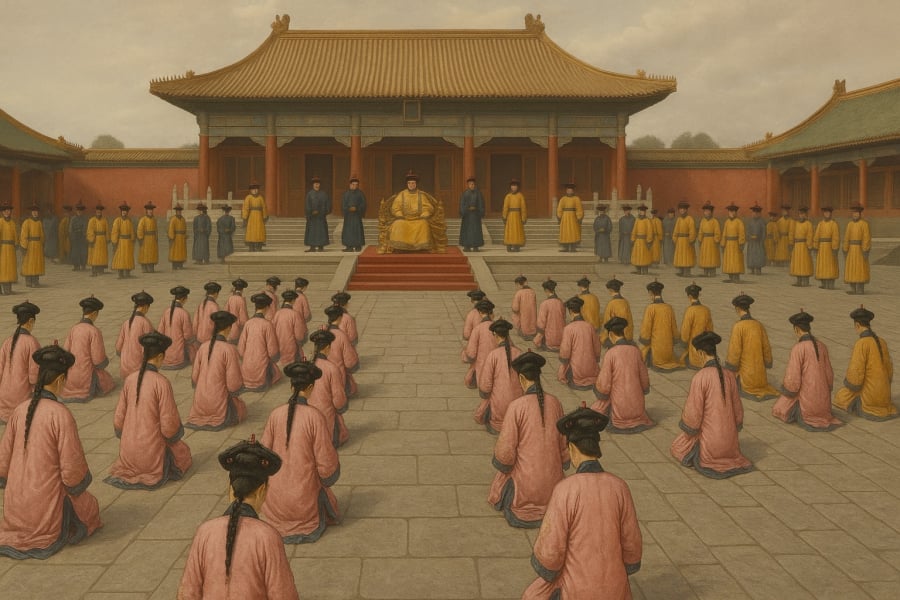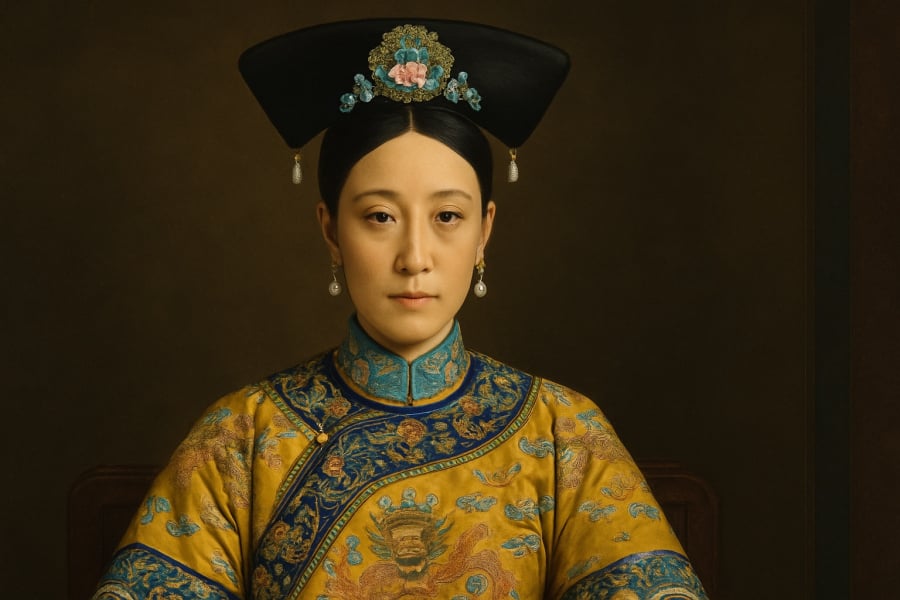Without the political prowess of Cixi, and leaving no grand political legacy, Empress Dowager Ci’an was the only woman to be instated as Empress during the reign of Emperor Xianfeng. Even more remarkably, she received this title within just eight months of entering the palace. Her swift yet discreet rise to power is a little-mentioned chapter in the history of the Qing Dynasty, but it holds valuable lessons worth pondering.
A Prestigious Family Background – The Golden Ticket to the Imperial Harem
Empress Xiao Zhen Xian, whose original name is unknown, belonged to the Niuhuru clan—one of the most illustrious Manchu clans of the Bordered Blue Banner. This clan had produced several empresses and concubines since the early Qing Dynasty.
In the second year of Emperor Xianfeng’s reign (1852), she participated in the palace selection process and entered the palace with the title “Zhen Fei,” which was the fifth rank in the imperial harem.

From Zhen Fei to Empress in Just Eight Months
Soon after entering the palace, Zhen Fei won the favor of Emperor Xianfeng. Historical records describe her as gentle, calm, introspective, and notably uninterested in vying for the emperor’s attention.
Just one month later, she was promoted to the position of Zhen Gui Fei, the second-highest rank in the harem, just below the Empress.
In the eighth month, Emperor Xianfeng officially instated her as Empress, despite the presence of other potential candidates in the harem. This decision surprised many in the court, as no one had risen to such a position so quickly since the reign of Emperor Yongzheng.
Why Was She Promoted So Quickly?
A Powerful Family Backing
The Niuhuru clan was one of the Qing Dynasty’s important political backers. Elevating a woman from this clan to the position of Empress was seen as a move to stabilize power and the imperial harem.
A Calm and Non-Conspiring Nature
Unlike the cunning and scheming concubines, Zhen Fei stood out for her calmness, discretion, and ability to get along with others in the palace. To Emperor Xianfeng, who disliked the chaotic atmosphere of the harem, she was the ideal figure.
The Lack of a “Head of the Harem”
At that time, Emperor Xianfeng had not yet instated an Empress, and the harem lacked a figure to maintain order and political balance. Zhen Fei became the perfect choice to fill this role.

A Discreet Yet Influential Empress Dowager
After Emperor Xianfeng’s death in 1861, she became Empress Dowager Ci’an and co-regent with Empress Dowager Cixi during the reign of Emperor Tongzhi.
Despite her higher rank than Cixi due to her position as the primary empress, Ci’an remained discreet and did not involve herself deeply in court affairs, allowing Cixi to take the reins of power. However, she exerted significant influence within the inner court, maintaining discipline and uniting the complex harem forces.
According to Professor Wu Yangning of the University of Social Sciences and Humanities in Hanoi, “Ci’an was not verbose or politically ambitious, but she had a significant say in maintaining stability within the imperial family during the Tongzhi era.” (Research on History Journal, Issue 4/2020)
A Peaceful End for a Calm Empress
In 1881, Empress Dowager Ci’an passed away peacefully. Unlike the scandal-ridden Cixi, Ci’an was respected by her contemporaries and posterity as a model empress: free from court intrigue, scandals, and maintaining her integrity and virtue throughout her life.
She was buried with great solemnity at Dingdongling, next to Emperor Xianfeng, and was posthumously honored with the title: Empress Xiao Zhen Ren He Gong Yi Duan Hui Xian.
Conclusion
In the midst of the Qing Dynasty’s imperial harem, filled with intrigue and power struggles, Empress Xiao Zhen Xian, or Empress Dowager Ci’an, stands out as a unique figure. Without resorting to schemes or vying for the emperor’s favor, she rose to the pinnacle of power through her virtues, tact, and the qualities of an educated and compassionate woman.
Perhaps because she was unassuming, history has somewhat overlooked her. However, upon closer inspection, she embodies the ideal qualities of an empress in the eyes of Eastern monarchs.
The Forbidden City’s Secrets: Why Were Qing Dynasty Concubines Bound to Silence Post-Intimacy?
“Within the intricate web of rituals and stringent rules that governed life in the Qing Dynasty’s harem, a haunting ‘unspoken rule’ existed: absolute silence was mandated for the consorts during imperial bedchamber rituals. This eerie mandate loomed over the women, casting a shadow of secrecy and intrigue within the depths of the imperial quarters.”
Why Did Emperor Qianlong Order the Destruction of Yan Wenjing’s Tomb?
“The enigmatic Emperor Qianlong’s unexpected orders to raze the tomb of Dian Wenjing, a trusted courtier favored by Emperor Yongzheng, shocked the court and left historians with intriguing questions. This intriguing episode, which occurred after the imperial sacrifice at Tai Ling, sheds light on the complex dynamics of imperial China and the enigmatic decisions of its rulers.”
Why Did Consorts Need to Be Escorted After Bedding the Emperor?
The intrigue and mysteries of the imperial harem have long fascinated historians and enthusiasts alike. One such intrigue is the practice of consorts being escorted back to their quarters after an intimate encounter with the emperor. This was no mere courtesy, but a pivotal protocol within the confines of the forbidden city.





































